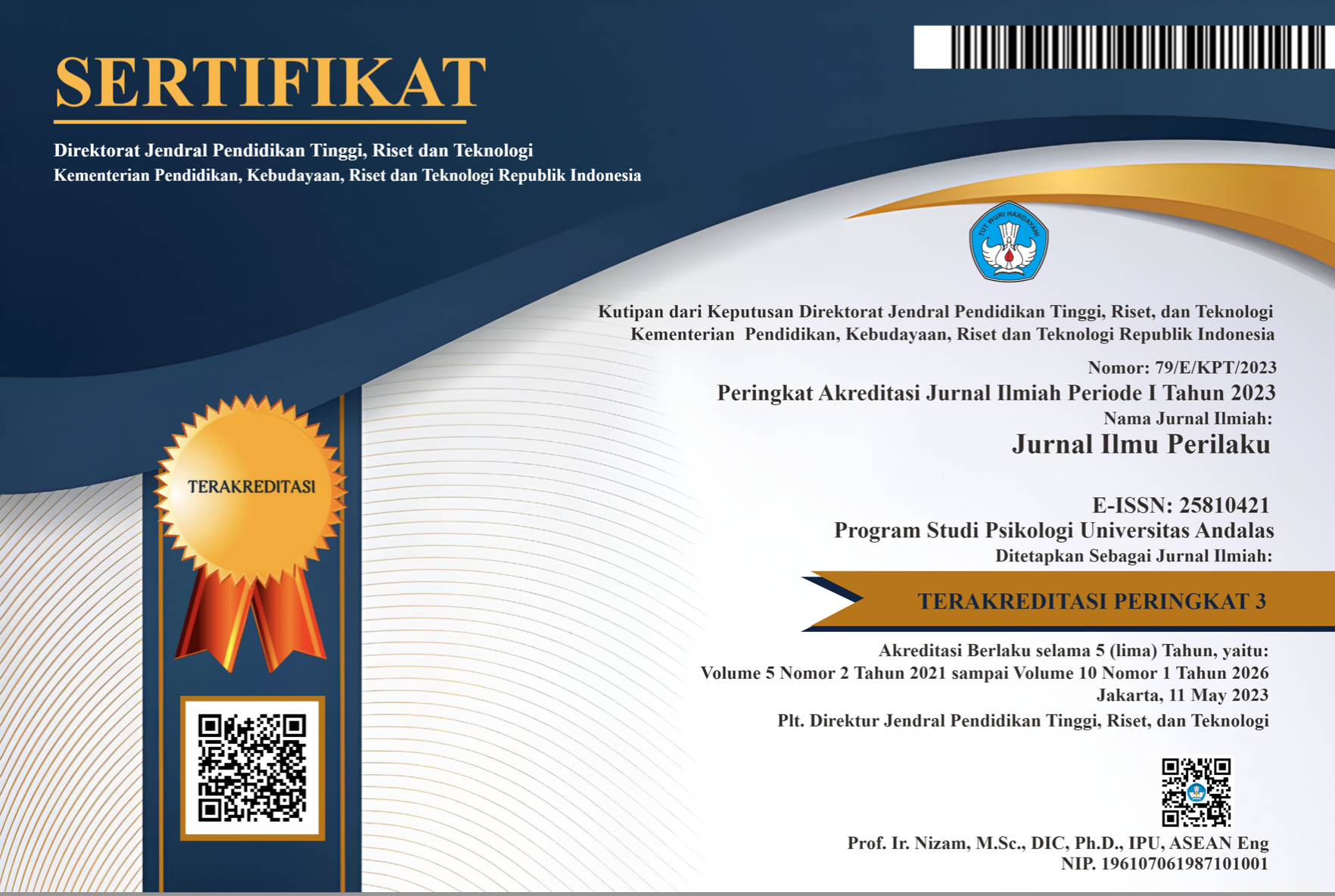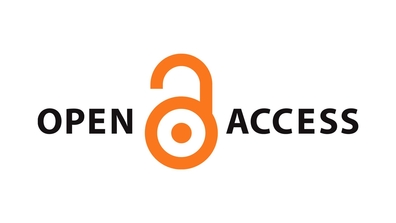Pengetahuan Mengenai Disabilitas sebagai Prediktor Sikap dalam Menangani SBK pada Guru SD Inklusi X
Abstract
Salah satu faktor penting untuk mengoptimalkan pendidikan Siswa Berkebutuhan Khusus (SBK) dalam sistem pendidikan adalah guru. Namun, seringkali dijumpai praktik penanganan di kelas yang belum sesuai dengan kebutuhan siswa dan kebijakan yang berlaku. Penelitian terdahulu sering membahas sikap guru terhadap SBK sebagai faktor yang belum tepat terhadap penanganan SBK terutama di sekolah inklusi. Sikap dapat diprediksi oleh berbagai variabel, namun pengetahuan mengenai disabilitas dalam konteks inklusif merupakan hal yang cukup penting. Penelitian mixed method dengan pendekatan explanatory sequential ini dilakukan secara khusus kepada 22 guru di SD Inklusi X, Jakarta, dengan menggunakan teknik analisis regresi linier. Variabel pengetahuan mengenai disabilitas secara statistik dapat memprediksi sikap guru dalam menangani SBK di kelas (=.315; p= .007). Sebanyak 40,9% guru memiliki pengetahuan mengenai disabilitas pada kategori rendah, 40,9% guru berkategori sedang, dan 18,2% lainnya berkategori tinggi. Sementara terkait sikap guru dalam menangani SBK di kelas, 59,1% berkategori netral dan 40,9% berkategori positif. Tidak ada perbedaan tingkat pengetahuan mengenai disabilitas dan sikap guru dalam menangani SBK di kelas berdasarkan kelompok yang dibagi menurut data demografi. Ditemukan adanya perbedaan pada data kualitatif melalui wawancara perwakilan guru. Disarankan agar pihak sekolah memfasilitasi guru untuk mengikuti pelatihan terkait pengetahuan mengenai disabilitas dalam konteks inklusif.
Kata kunci: sikap guru, pengetahuan mengenai disabilitas, siswa berkebutuhan khusus, SD inklusi
Downloads
References
Alqarni, T., Algethami, R., Alsolmi, A., & Adhabi, E. (2019). College students’ knowledge and attitudes toward the inclusion of persons with disabilities in the university. Education, 9(1), 9–18. http://article.sapub. org/10.5923.j.edu.20190901.02.html.
American Psychiatric Association. (2013). Diagnostic and statistical manual of mental disorder edition (DSM-5). American Psychiatric Publishing.
Amka, A. (2017). Implementasi Pendidikan Karakter Inklusi Bagi Anak Berkebutuhan Khusus Di Sekolah Reguler. Madrosatuna: Journal of Islamic Elementary School, 1(1), 1-12.
Amr, M., Al-Natour, M., Al-Abdallat, B., & Alkhamra, H. (2016). Primary school teachers’ knowledge, attitudes, and views on barriers to inclusion in Jordan. International Journal of Special Education, 31(1).
Azwar, S. (2012). Penyusunan skala psikologi (Edisi ke-2). Pustaka Pelajar.
Bassey, A. B., Ikwen, E.U., Owan, V. J., & Amanso, E. O. (2020). Teachers' attitudes towards learners with disability scale (TALDS): Construction and psychometric analysis. The Journal Of Social Science Research, 6(5), 518-530. https://doi.org/10.32861/jssr.65.518.530
Chan, J. F. (2010). Designing and developing training programs. Pfeiffer.
Creswell, J. W. (2014). Research design: Qualitative, quantitative, and mixed methods approaches. Sage Publications.
Dapudong, R. C. (2013). Knowledge and attitude towards inclusive education of children with learning disabilities: The case of thai primary school teachers. Academic Research International, 4(4), 496-512.
Dapudong, R. C. (2014). Teachers’ knowledge and attitude towards inclusive education: Basis for an enhanced professional development program. International Journal of Learning & Development, 4(4), 1-24.
De Boer, A., Pijl, S. J., & Minnaert, A. (2011). Regular primary schoolteachers’ attitudes towards inclusive education: a review of the literature. International Journal of Inclusive Education, 15(3), 331–353. doi:10.1080/13603110903030089
Field, A. (2013). Discovering statistics using IBM SPSS statistics (4th ed.). SAGE Publications.
Florian, L. (2014). The sage handbook of special education (2nd ed). Sage Publications.
Gravetter, F. J., & Wallnau, L. B. (2013). Statistics for the behavioral science (10th ed.). Cengage Learning.
Haddock, G., & Maio, G. R. (2008). Attitudes: Content structure, and function. Blackwell.
Hallahan, D. P., Kauffman, J. M., & Pullen, P. C. (2014). Exceptional learners an introduction to special education twelfth edition. Pearson.
Handayani, T., & Rahadian, A.S. (2013). Peraturan perundangan dan implementasi pendidikan inklusif. Masyarakat Indonesia, 39 (1), 27-48.
Hasugian, J.W., Gaurifa, S., Warella, S.B., & Kelelufna, J.H. (2019). Education for children with special needs in Indonesia. Journal of Physics: Conference Series. https://doi.org/10.1088/1742-6596/1175/1/01217
Kementerian Pendidikan dan Kebudayaan. (2011). Pedoman umum penyelenggaraan pendidikan inklusif. Direktorat PPK-LK Pendidikan Dasar.
Kaplan, R. M., & Saccuzzo, D. P. (2009). Psychological testing principles, applications, and issues (7th ed.). Wadsworth Cengage Learning.
Kurniawati, F., Minnaert, A., Mangunsong, F., Ahmed, W. (2012). Empirical Study on Primary School Teachers’ Attitudes Towards Inclusive Education in Jakarta, Indonesia. Procedia - Social and Behavioral Sciences, 69, 1430–1436. https://doi.org/10.1016/j.sbspro.2012.12.082
Nishan, F., & Matzin, R. (2020). Factors Contributing to Teacher Attitudes towards Inclusive Education. Asian Journal of Research in Education and Social Sciences, 2(3), 34-44.
Offor, D.I., Akinlosotu, N.T. (2017). Teachers’ Attitude towards Special Need Students in Secondary Schools in North Senatorial District of Edo State, Nigeria. Journal of Education and Practice, 8(4), 6-12.
Departemen Pendidikan Nasional. (2008). Peraturan Menteri Pendidikan Nasional Republik Indonesia Nomor 32 Tahun 2008 tentang Standar Kualifikasi Akademik dan Kompetensi Guru Pendidikan Khusus. Departemen Pendidikan Nasional.
Peraturan Menteri Pendidikan Nasional Republik Indonesia Nomor 70 Tahun 2009 tentang Pendidikan Inklusif bagi Peserta Didik yang Memiliki Kelainan dan Memiliki Potensi Kecerdasan dan/atau Bakat Istimewa. Jakarta: Departemen Pendidikan Nasional, 2009.
Priyatno, D. (2013). Analisis data dengan SPSS. Media Kom.
Razali, M., & Yap, B. (2011). Power comparisons of shapiro-wilk, kolmogorov-smirnov, lilliefors and anderson-darling tests. J. Stat. Model. Analytics, 2.
Shevchenko, Y. M., Dubiaha, S. M., Melash, V. D., Fefilova, T. V., & Saenko, Y. Ð. (2020). The Role of Teachers in the Organization of Inclusive Education of Primary School Pupils. International Journal of Higher Education, 9(7), 207–216. https://doi.org/10.5430/ijhe.v9n7p207
Srivastava, M., De Boer, A. A., & Pijl, S. J. (2017): Preparing for the inclusive classroom: changing teachers’ attitudes and knowledge. Teacher Development 1-19. https://doi.org/10.1080/13664530.2017.1279681
Sugiyono. (2017). Metode penelitian kuantitatif, kualitatif, R&D. Alfabeta.
Sundayana, R. (2016). Statistika Penelitian Pendidikan. Bandung: Alfabeta.
Taherdoost, H. (2019). What is the best response scale for survey and questionnaire design; review of different lengths of rating scale / attitude scale / likert scale. International Journal of Academic Research in Management (IJARM), 8(1), 1-12.
Teddlie, C., & Tashakkori, A. (2010). Overview of contemporary issues in mixed methods research. Sage handbook of mixed methods in social and behavioral research, 2, 1-44.
Undang-Undang Republik Indonesia Nomor 20 Tahun 2003 Tentang Sistem Pendidikan Nasional.
Wahyudi., & Kristiawati, R. (2016). Gambaran sekolah inklusi di Indonesia: tinjauan sekolah menengah pertama. Pusat Data Statistik Pendidikan dan Kebudayaan.
The non-commercial use of the article is governed by the Creative Commons Attribution license as currently displayed on Creative Commons Attribution-NonCommercial-ShareAlike 4.0 International License.
JIP's spirit is to disseminate articles published are as free as possible. Under the Creative Commons license, JIP permits users to copy, distribute, display, and perform the work for non-commercial purposes only. Users will also need to attribute authors and JIP on distributing works in the journal.
Please find the rights and licenses in Jurnal Ilmu Perilaku (JIP).
- License
The non-commercial use of the article will be governed by the Creative Commons Attribution license as currently displayed on Creative Commons Attribution-NonCommercial-ShareAlike 4.0 International License.
- Author’s Warranties
The author warrants that the article is original, written by stated author(s), has not been published before, contains no unlawful statements, does not infringe the rights of others, is subject to copyright that is vested exclusively in the author and free of any third party rights, and that any necessary written permissions to quote from other sources have been obtained by the author(s).
- User Rights
JIP's spirit is to disseminate articles published are as free as possible. Under the Creative Commons license, JIP permits users to copy, distribute, display, and perform the work for non-commercial purposes only. Users will also need to attribute authors and JIP on distributing works in the journal.
- Rights of Authors
Authors retain the following rights:
- Copyright, and other proprietary rights relating to the article, such as patent rights,
- The right to use the substance of the article in future own works, including lectures and books,
- The right to reproduce the article for own purposes, provided the copies are not offered for sale,
- The right to self-archive the article.
- Co-Authorship
If the article was jointly prepared by other authors, the signatory of this form warrants that he/she has been authorized by all co-authors to sign this agreement on their behalf, and agrees to inform his/her co-authors of the terms of this agreement.
- Termination
This agreement can be terminated by the author or JIP upon two months’ notice where the other party has materially breached this agreement and failed to remedy such breach within a month of being given the terminating party’s notice requesting such breach to be remedied. No breach or violation of this agreement will cause this agreement or any license granted in it to terminate automatically or affect the definition of JIP.
- Royalties
This agreement entitles the author to no royalties or other fees. To such extent as legally permissible, the author waives his or her right to collect royalties relative to the article in respect of any use of the article by JIP or its sublicensee.
- Miscellaneous
JIP will publish the article (or have it published) in the journal if the article’s editorial process is successfully completed and JIP or its sublicensee has become obligated to have the article published. JIP may conform the article to a style of punctuation, spelling, capitalization, referencing and usage that it deems appropriate. The author acknowledges that the article may be published so that it will be publicly accessible and such access will be free of charge for the readers.










